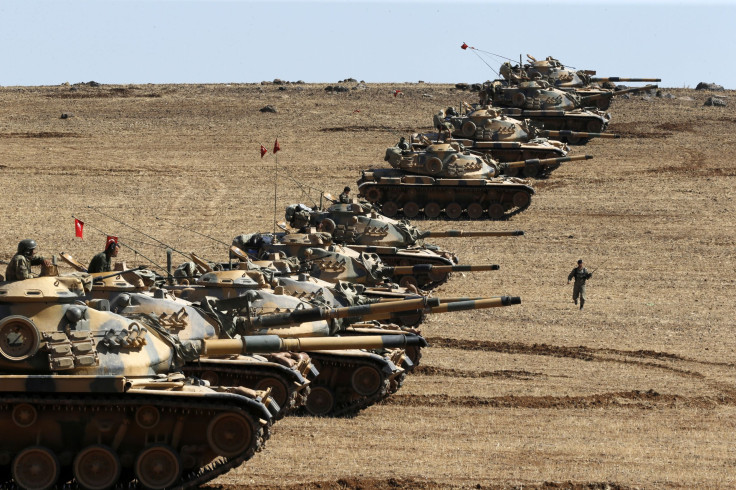As Kurds Near Defeat In Kobane, Airstrikes-Only Strategy Shows Limits

As the battle over the northern Syrian town of Kobane continues into a third week, a spokesperson for Kurdish fighters defending the town from ISIS attacks has said U.S.-led airstrikes have failed to stop the momentum of the terrorist group. But the coalition of Western and Arab nations fighting ISIS has been reluctant to intervene militarily with soldiers on the ground, and airstrikes are proving insufficient to keep the terrorist group out of the strategically placed town.
“The counterinsurgency will not work without ground forces," said Max Abrahms, a terrorism expert and professor at Northwestern University. But those forces do not have to be American. "I think that if we seriously armed Kurds in Kobani and took out as many targets from the air as possible, I see no reason why the town should fall,” Abrahms said.
The fall of the town to ISIS now seems more likely after a spokesperson for the Kurdish fighters said Sunday that U.S. airstrikes had not been effective enough. “Air strikes alone are really not enough to defeat ISIS in Kobane,” said Idris Nassan, a spokesman for the Kurdish fighters desperately trying to defend the important strategic town from the advancing militants. “They are besieging the city on three sides, and fighter jets simply cannot hit each and every ISIS fighter on the ground.”
But while arming the Kurds with better weapons would go some way toward slowing the ISIS advance, there are fears the U.S. might be inadvertently arming its enemy, as was the case when ISIS overran Iraqi military bases and stole U.S.-made tanks and weapons. Others cite the longstanding enmity between Kurds and Turkey, a member of NATO and U.S. ally for decades. This places the U.S. in a strategic quandary because while President Barack Obama has vowed to destroy ISIS using air strikes and assistance from ground forces, he will be hesitant to anger Turkey by arming the Kurds.
“Some people are saying the reason we’re [U.S.] not helping out the Kurds fight ISIS in Syria is because of Turkey,” Abrahms said. But “we should arm the Kurds, regardless. They are fighting with rifles against ISIS which has tanks that were from the U.S. If we want to level the playing field we need to arm our ally, not just our enemy.”
The city of Kobane has been under siege for the last three weeks, and more than 160,000 people, largely ethnic Kurds, have fled across the Turkish border since the offensive began, aggravating the historical tensions between Turkey and Kurds. But the strategic significance of the town may yet see the two put their differences aside. The fall of Kobane would give ISIS control over a large swath of the Syrian-Turkish border.
Obama has repeatedly said sending U.S. ground forces to fight ISIS was not an option in Syria or Iraq. However, calls for such a move are beginning to gain traction in Washington.
“There is no way I can see how we’re going to fix the problem in Iraq in Syria without American ground troops,” said Republican Sen. Lindsay Graham. “This mythical Arab army we’re trying to get up to go in on the ground in Syria will need a lot of American hand-holding." (Kurds, however, are not Arabs; Graham may have been referring to U.S. allies in the Middle East who already have taken part in or supported airstrikes, including Saudi Arabia, Jordan, the United Arab Emirates and Qatar.)
“Mr. President, level with the American people: You need boots on the ground,” Graham added. “American soldiers to go to Syria and Iraq as part of a coalition, and we’re going to need more than 4,000 to destroy ISIL in Iraq and Syria.”
© Copyright IBTimes 2024. All rights reserved.






















